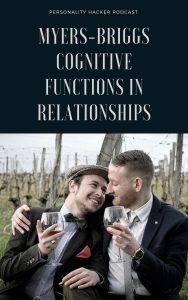Download Episode Here – right click link and select “Save Link As…”
In this episode Joel and Antonia talk about the Myers-Briggs cognitive functions and how they play a role in romantic relationships.
In this podcast you’ll find:
- Dichotomy in Relationships podcast
- Car Model
- Reference Guides for each cognitive function stack
- The Driver function is very unconscious. You do it automatically.
- If you are in a relationship with somebody who suppresses that driver function, it will cause conflict or depression.
- The driver puts you into flow. It energizes you and makes you feel good.
- It’s not good to be in a situation where that function isn’t being allowed expression.
- Get very clear on your dominant process, and your spouse’s, then have a conversation around it so you can both be aware of each other’s needs.
- Determine if you are leading with a learning process or a decision-making process.
- If your Driver is an iNtuitive or Sensing function, you lead with a learning process (referred to as Perceiving process in the podcast).
- If your driver is a Feeling or Thinking function, you lead with a decision making process.
- If one partner leads with a learning process and the other leads with a decision-making process, it can create conflict.
- People who lead with a learning process tend to hesitate before they make decisions. They want more info before they make a decision.
- Someone who leads with a decision-making process is going to come across way more decisive and live their lives in the realm of should statements.
- Two people driving with judging functions can create friction because each is certain how things should be.
- Two people who lead with learning process can take a long time to make a decision.
- A female who leads with a decision-making process and ends up in a relationship with a man who leads with a learning process may feel like she has to make all the decisions. She may feel like she can’t rest into him because he is so slow to make decisions.
- The Copilot is our auxiliary cognitive function. Our growth state. It’s important we work on this process and use it.
- The Copilot is a more conscious part of our personality, and we can have a tendency to bypass it if we want to stay in a comfortable place.
- When we first start working on our copilot, it could be messy. Stay the course!
- Get clear on the needs of your copilot. If you are an extravert and your copilot is introverted, you have to have introverted time.
- Some people just need to know what is going on with you. Be clear about your needs, so the other person doesn’t misunderstand your actions.
- The Tertiary cognitive function (10 yr old) will be the same attitude as the driver. If your driver is introverted, this process will be introverted. It is a comfortable place for us.
- This function is best when used in times of play. Don’t let it run the show. Let it play, like a 10 yr old.
- When we ignore the copilot and stay in the attitude of the driver and tertiary process, it isn’t a good place for a person to be. We call it a loop.
- Figure out how you loop and discuss it openly so each can identify when it is happening.
- Why are you in the loop? What do you need to get back into your copilot?
- A lot of conflicts come from both people being in this 10 yr old process.
- Out of conflict comes intimacy.
- You can build understanding and intimacy through the conflict if you have the awareness to understand what is going on.
- If someone is getting stuck in the 10 yr old and it is a learning process, it can come across as avoidance. Either avoiding info or seeking distraction.
- If someone is getting stuck in 10 yr old and it is a judging or decision-making process it can show up as being resolute and insistent it is right.
- Te/Fe will try to push the outer world. Ti/Fi can look like you are sticking your flag in the ground and refusing to be budged.
- You might be fighting two different games if your spouse is one way and you are the other.
- If one can be aware enough to get out of the 10 yr old, they can help the situation by pulling the other person out of their 10 yr old.
- It’s not about winning or losing. It’s about building intimacy.
- The 10 yr old is the one that you are going to notice coming up more than anything else.
- The inferior process, 3 yr old, has the maturity of a 3 yr old.
- It is not conscious for most people. It feels icky sometimes.
- If you put your mate in a situation where their 3 yr old is exposed and hurt it will be interpreted as a betrayal.
- How does your 3 yr old show up and what would be a massive betrayal for you? What about your spouses 3 yr old. What would be a betrayal of them?
- Look at the car models for each personality side by side.
- See how they compare and contrast.
- What strengths do you share?
- What weaknesses do you share?
- How can compensate for each other’s blind spots?
- Create language and framework around your personalities so you can speak to each other’s strengths and weaknesses.
- Use this knowledge to increase understanding and open conversation.
- Don’t use this as a weapon.
- Use it as a means to improve communication and connection.
- Just having the language solves the majority of conflict.
To subscribe to the podcast, please use the links below:
Subscribe with iTunes
Non iTunes Link
Download The Android App
Subscribe on Soundcloud
Subscribe with Stitcher
Subscribe on Google Play
If you like the podcast and want to help us out in return, please leave an honest rating and review on iTunes by clicking here. It will help the show and its ranking in iTunes immensely! We would be eternally grateful!
Want to learn more?
Discover Your Personal Genius
We want to hear from you. Leave your comments below…



Share:
Podcast - Episode 0159 - Myers-Briggs Dichotomies In Relationships
Podcast - Episode 0161 - Systems Thinking In Relationships
20 comments
I need help with this one. I’m INTP and my hubby is ISFJ. That means our stacks are Ti, Ne, Si, Fe (me) and Si, Fe, Ti, Ne (hubby).
Our 10 year old functions are each other’s primary/driver functions. It’s super easy to let each other loop. And, when you had a guest on talking about parenting your 10 year old with your driver, that means I am trying to use my hubby’s primary and his strength feels like parenting to me.
In addition, where we each need to grow is where the other is most fragile. So mucking around with our auxiliary/passenger function almost inevitably feels harmful to the other. This is especially true of me to him. He’s not eager to work on Fe being a super strong introvert. He cares for people but only those closest to him.
So I’m not sure how to get unstuck. If I can be more clear, please let me know.
Thanks Brooke for the feedback. So happy the podcast resonated with you and your relationship.
So I’m listening to this podcast and I’d just like to add some thoughts. I am an INFJ, my husband is an INFP. My driver is actually a perceiving process and my husband’s is a judging process. This has been a huge source of confusion for both of us because in many other areas of our lives I prefer a judging outlook and he is a perceiver. I completely understand why you would choose to talk about some obvious difficulties, like between an ENFJ + ENFP, because their driver alines with their personality type, but I did feel a little disappointed that you didn’t address the difficulty of being in an opposite position (especially when both parties are opposite).
Thank you thank you thank you so much for this podcast!! I found so much congruency with what you said in my relationship with my spouse… I understand my husband’s car model and my car model much better and I learned how we each compliment and help each other more, and also be more sensitive to each other more. Your explanations pinpointed exactly why my spouse and I have gotten along and helped each other, and your explanations helped explain why our actions may have caused some of our tougher times without us really identifying why.. I’m going to be working on your tips and seeing the bigger picture on how we can help each other grow as individuals and in our relationship and prevent conflict. Thank you!!
Hi! I’m an INFP, so my 3 year old is extraverted thinking, while my husband’s (intj) is extraverted sensing. Can someone give me example of attacking each other’s 3 year olds?